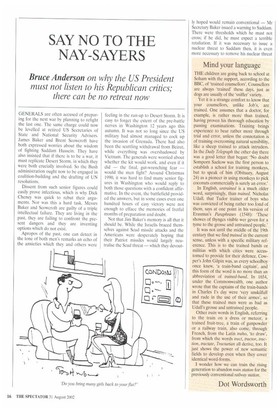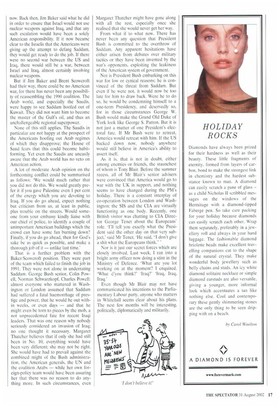SAY NO TO THE NAY-SAYERS
Bruce Anderson on why the US President
must not listen to his Republican critics; there can be no retreat now
GENERALS are often accused of preparing for the next war by planning to refight the last one. The same charge could now be levelled at retired US Secretaries of State and National Security Advisers. James Baker and Brent Scowcroft have both expressed worries about the wisdom of fighting Saddam Hussein. They have also insisted that if there is to be a war, it must replicate Desert Storm, in which they were both crucially involved. So the Bush administration ought now to be engaged in coalition-building and the drafting of UN resolutions.
Dissent from such senior figures could easily prove infectious, which is why Dick Cheney was quick to rebut their arguments. Nor was this a hard task. Messrs Baker and Scowcroft are guilty of a triple intellectual failure. They are living in the past, they are failing to confront the present dangers and they are inventing options which do not exist.
Apropos of the past, one can detect in the tone of both men's remarks an echo of the anxieties which they and others were feeling in the run-up to Desert Storm. It is easy to forget the extent of the pre-battle nerves in Washington 12 years ago this autumn. It was not so long since the US military had almost managed to cock up the invasion of Grenada. There had also been the scuttling withdrawal from Beirut, while everything was overshadowed by Vietnam. The generals were worried about whether the kit would work, and even if it did — the final, gut-wrenching fear — would the men fight? Around Christmas 1990, it was hard to find many senior figures in Washington who would reply to both those questions with a confident affirmative. In the event, the battlefield provided the answers, but in some cases even one hundred hours of easy victory were not enough to efface the memories of fretful months of preparation and doubt.
Not that Jim Baker's memory is all that it should be. While the Israelis braced themselves against Scud missile attacks and the Americans were desperately hoping that their Patriot missiles would largely neutralise the Scud threat — which they devout
ly hoped would remain conventional — Mr Secretary Baker issued a warning to Saddam. There were thresholds which he must not cross; if he did, he must expect a terrible retaliation. If it was necessary to issue a nuclear threat to Saddam then, it is even more necessary to remove his nuclear threat
now. Back then. Jim Baker said what he did in order to ensure that Israel would not use nuclear weapons against Iraq, and that any such escalation would have been a solely American responsibility. If it now became clear to the Israelis that the Americans were giving up the attempt to defang Saddam, they would get ready to do the job. If there were no second war between the US and Iraq, there would still be a war, between Israel and Iraq, almost certainly involving nuclear weapons.
But if Jim Baker and Brent Scowcroft had their way, there could be no American war, for there has never been any possibility of reassembling the 1990 coalition. The Arab world, and especially the Saudis, were happy to see Saddam hoofed out of Kuwait. They did not want him to become the master of the Gulf's oil, and thus an unchallengeable regional superpower.
None of this still applies. The Saudis in particular are not happy at the prospect of the Americans hoofing out Arab regimes of which they disapprove; the House of Saud fears that this could become habitforming. Yet even the Saudis are uneasily aware that the Arab world has no veto on American action.
A lot of moderate Arab opinion on the forthcoming conflict could be summarised as follows: 'We would much rather that you did not do this. We would greatly prefer it if you gave Palestine even 1 per cent of the energy which you are devoting to Iraq. If you do go ahead, expect nothing but criticism from us, at least in public, plus trouble on the streets. Would someone from your embassy kindly liaise with our chief of police, to identify a couple of unimportant American buildings which the crowd can have some fun burning down? Finally, if you do go ahead, then for God's sake be as quick as possible, and make a thorough job of it — unlike last time.'
That is a further problem with the Baker/Scovvcroft position. They were part of the team which failed to finish the job in 1991. They were not alone in underrating Saddam. George Bush senior, Colin Powell, Norman Schwarzkopf, Charles Powell: almost everyone who mattered in Washington or London assumed that Saddam had suffered a fatal haemorrhage of prestige and power, that he would be out within weeks, or even days — and that he might even be torn to pieces by the mob, a not unprecedented fate for recent Iraqi leaders. That was one reason why nobody seriously considered an invasion of Iraq; no one thought it necessary. Margaret Thatcher believes that if only she had still been in No. 10, everything would have been very different; she may not be right. She would have had to prevail against the combined might of the Bush administration, the American generals, the UN and the coalition Arabs — while her own foreign-policy team would have been assuring her that there was no reason to do anything more. In such circumstances, even Margaret Thatcher might have gone along with all the rest, especially once she realised that she would never get her way.
From what if to what now. There has never been any question that President Bush is committed to the overthrow of Saddam. Any apparent hesitations have either arisen from debates over military tactics or they have been invented by the war's opponents, exploiting the leakiness of the American system of government.
Nor is President Bush embarking on this war for low or cynical reasons; he is convinced of the threat from Saddam. But even if he were not, it would now be too late for him to draw back. Were he to do so, he would be condemning himself to a one-term Presidency, and deservedly so, for in those circumstances George W. Bush would make the Grand Old Duke of York look like George S. Patton. But it is not just a matter of one President's electoral fate. If Mr Bush were to retreat, America would retreat with him. If the US backed down now, nobody anywhere would still believe in America's ability to assert itself.
As it is, that is not in doubt, either among enemies or friends, the staunchest of whom is Tony Blair. Before the summer recess, all of Mr Blair's senior advisers were convinced that America would go to war with the UK in support, and nothing seems to have changed during the PM's holiday. There is a constant interplay of co-operation between London and Washington; the SIS and the CIA are virtually functioning as one body. Recently, one British visitor was chatting to CIA Director George Tenet about the Europeans' role. 111 tell you exactly what the President said the other day on that very subject,' said Mr Tenet. 'He said, I don't give a shit what the Europeans think.
Nor is it just our secret forces which are closely involved. Last week, I ran into a bright army officer now doing a stint in the Ministry of Defence. 'What are you lot working on at the moment? I enquired.
'What d'you think?' 'Iraq?' Iraq, Iraq.'
Even though Mr Blair may not have communicated his intentions to the Parliamentary Labour party, anyone who matters in Whitehall seems clear about his plans. The next few months will be interesting, politically, diplomatically and militarily.



























































 Previous page
Previous page